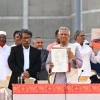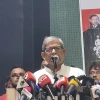Bangladesh Jamaat-e-Islami’s Assistant Secretary General Hamidur Rahman Azad has said that despite the signing of the July Charter, significant challenges and uncertainties remain over its implementation.
Speaking on Friday afternoon immediately after the signing ceremony, Azad said that while the event marked a formal conclusion, some dissent persisted over certain aspects of the charter.
The signature ceremony today was a good closure, but out of the 84 clauses we agreed upon in the Consensus Commission, some have issued a note of dissent. Ideally, the signing would have taken place without any notes of dissent,” he said.
Azad described the signing as a “social contract,” but noted that without a legal foundation, the charter cannot fully meet expectations. “Here, a challenge and a crisis remain,” he added.
Asked to elaborate on the challenges, he said the main concern was how and to what extent the charter would be implemented.
We discussed for five consecutive days. In the concluding session, the Vice-Chairman of the Consensus Commission, Professor Ali Riaz, provided a conclusion, stating that a recommendation framework on the implementation process would be prepared. We were supposed to receive a draft, and it would also be sent to the government. However, despite repeated attempts, we have not received it. Even today, we discussed this, and the implementation process remains unclear to the nation,” he said.
When asked whether there was doubt regarding the implementation, Azad stressed the need for legal backing.
We have said a legal basis must be provided. Without it, the charter risks undermining the revolutionary spirit and the reforms intended to achieve consensus. That is why we have previously called for an order to be issued and for a referendum to ensure its sustainability,” he added.


 Prev Post :
Prev Post :
